Ubereats, Deliveroo, JustEat, ideas on ordering a suitable meal when you have IBS?

The introduction of food delivery apps some years ago, means they have been used by many of us. For example, when we are unwell, do not have the time to cook, or just want to be able to enjoy a restaurant meal at home. During the pandemic, with people largely unable to eat outside their homes for extended periods, this has been an important source of both nourishment and pleasure. Food and meals provide our fuel for health and ongoing survival, but also frame our day, bring us joy and connection us with others. Reliance on receiving home-delivered meals using apps has to some extent never been more important.
A recent study found that customer experience and ease-of-use were two important factors in deciding whether to use a food app.
How about health?
Irritable bowel syndrome is one of many diseases and disorders which can require individuals to modify or monitor their diet. It is a disorder which affects the large intestine and presents with a range of symptoms including abdominal pain/cramps, gas, bloating, diarrhoea and/or constipation or a combination of both.
You can have a look at our other blogs on IBS on our website by clicking on the links below:
- Bile salt malabsorption and irritable bowel syndrome (IBS) – symptoms, diagnosis, medical and dietary management.
- Lifestyle therapies for management of IBS.
- I have IBS – should I be taking probiotics?
- An introduction to the Low FODMAP Diet.
IBS and Fodmap advice.
Although we appreciate that apps and food delivery services have a role particularly during the Covid-19 pandemic, people with IBS are often dependent on making dietary modifications, as certain foods can trigger highly unpleasant symptoms. So, knowing exactly what you’re eating is important. This does not mean that you cannot use food delivery apps/services, but there are challenges and we have listed some guidance below on how to make it more possible.
- Ask yourself before you tap. whether this is a necessity, or a convenience? Do you have the time and energy perhaps to prepare a meal? Do you have the ingredients or perhaps you are ‘shielding’ and dependent upon others to do the shopping or are awaiting a supermarket delivery? If you do have the ingredients, time and physical capability, then in terms of your digestion, it may well be better to cook a simple, fresh meal.
- Creating your favourite meals at home. We know, it’s not the same! But if you do find some time, try preparing one of your favourite restaurant meals from home, minus the ingredients which trigger your IBS. Many people are managing their symptoms by trialling a Low FODMAP diet for 4-8 weeks. There are some great IBS recipes sites on the internet such as Monash University: The IBS Dietitian website Kings College London FODMAP app available on ITunes or Google Play.
- Maybe also make some extra, so you can freeze it and it will be ready for whenever you want!
- Some apps have a filter option whereby you can select meals which cater to a certain dietary need. Unfortunately, not all apps can do this as yet. But apps such as UberEats provide a filter option, for example for gluten-free options for coeliac disease, allergies etc. which may be useful to you if avoiding, wheat or milk.
- If you’ve come to the decision that you are going to use a mobile food app, try and choose a meal from a restaurant which uses largely fresh ingredients rather than a ‘fast food’ chain product. Having a meal that is not too greasy and full of additives can be important in helping you manage your IBS symptoms. We all have different foods which trigger different symptoms, so look out for foods that triggers yours using our Food and Symptom diary. For example, you may want to avoid spicy curries or dishes that contains milk, dairy, onions or pulses, if you already know that these aggravate your symptoms.
- If the information written on the app is not sufficiently detailed and that can be the case, then you can easily give the restaurant a call and request more detail before placing your order. This way, you will have some peace of mind and can order from them again once you know that they serve food which caters to your needs.
- There are also a number of apps that provide fresh ingredients with accompanying recipes delivered to your home for meal preparation. These include Mindful Chef (gluten-free and dairy free options), Hello Fresh where allergens and ingredients are indicated on each website recipe. It’s definitely not a cheap option, but one that may suit you, if you are time short and want all the meal ingredients prepared and delivered directly to your home. This option can be helpful, if you have IBS and want a freshly prepared meal, avoiding trigger foods.
- Watch this space. With the demand of mobile food apps ever increasing, this is giving companies the opportunity to further develop the technology and provide a wider range of customer options. This includes additional healthy, more sustainable food products used within dishes, as well as packaging options. Who’s not to say that there won’t be an app for those following a Low FODMAP diet in the future?
If using these apps helps you maintain a balanced, and sustainable lifestyle – they can be an invaluable support particularly when people may be struggling to purchase their food and prepare a meal daily.
Balanced eating is focussed on having a variety of foods to support our health and wellbeing, even if we have to avoid certain foods in the short or longer term to keep IBS well controlled.
Overall, food apps can be enjoyed by all as part of a balanced, sustainable lifestyle and we hope you found the above tips helpful.
Resources. BDA. Health Eating: Food Fact Sheet.

This blog was written by Registered Dietitian Sena Ali and edited by Sian Shepherd (Specialist Gastroenterology Dietitian) – February 2021
Do leave us a comment below:
Tags: begoodtoyourgut, British Dietetic Association, Digestive Health, FODMAP, food delivery apps, Gut Health, IBS, Irritable Bowel Syndrome, Low FODMAP, Mindful Chef, UberEats
0 Comment

Leave a Reply